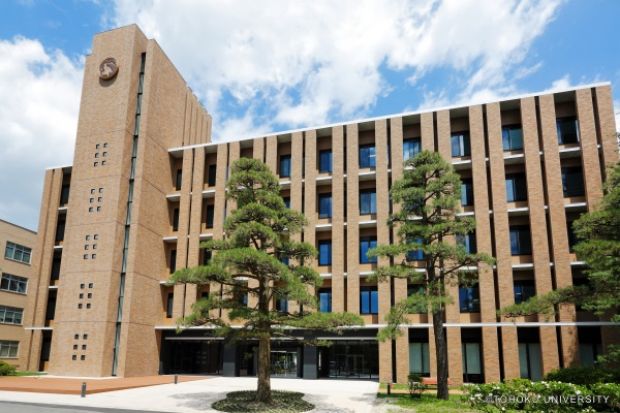Tohoku University: Berlin Science Week 2021 Public Lecture: The Future of Digital Health
Tohoku University hosted a public lecture at Berlin Science Week on November 5. The event attracted an in-person audience at the Museum für Naturkunde in Berlin, and was also streamed to some 200 viewers around the world.
After a brief welcome message from Tohoku University’s Executive Vice President for Research Motoko Kotani, the four-member panel explored the future of digital health, and the impact of rapidly evolving technology and data science on both lifespan and lifestyles.
176_20211129_berlin_science_week_pic2.jpg
Ryoichi Nagatomi, dean of the Graduate School of Biomedical Engineering at Tohoku University, kicked things off with a brief introduction of the university’s Centre of Innovation, where he is co-research leader on a project to create a society with self-and mutual assistance through unobtrusive sensors and continuous health monitoring. “Our aim is to identify our everyday health issues with unobtrusive sensor technology, so that we know what we need to do to have a healthy future.”
Cohort studies are traditionally used to identify bad habits so that public health guidelines can be formulated. These days, with improved digital technology and AI, analysis of continuously and longitudinally acquired data is faster and more accurate. And this, said Nagatomi, is leading to increasingly personalized and effective health guidance. “For example, one of the reasons many of us are able to live longer, is because advanced technologies have enabled us to predict or detect the onset of diseases early.”
The next step, he said, is to help people understand how the AI works for them, so that there is enough trust to prompt action. “We have a lot of guidelines and we often know what the problem is. In the very near future, data and technologies will provide you with more personalized recommendation. Now we need people to listen and to act.”
176_20211129_berlin_science_week_pic3.jpg
In his lecture, Giampaolo Pileggi, a research scientist at NEC Laboratories Europe GmbH, described the desirable features of an AI model in medicine which, he said, include the seamless integration of modalities in a single holistic representation; accurate personalised predictions; clear, explainable results; and scalability.
He also spoke about some of the promising biomedical AI projects, such as the “digital twin” technology that pairs the virtual and physical world by creating a digital copy of a person. This would allow doctors to experiment digitally to “simulate what happens to the patient without touching him,” said Pileggi. “By merging AI with physical and biological models, it is possible to overcome the limitations of the current algorithms.”
176_20211129_berlin_science_week_pic4_5.jpg
Nagatomi’s co-project leader at the Tohoku University Centre of Innovation, is Iwao Waga, who spoke on the importance of “reinventing how we live.” Many non-communicable diseases are connected to lifestyle choices, he said, such as poor diet, excessive exposure to blue light and too much time spent sitting down. Loneliness too, can cause mental health and other disorders.
Explaining how human data can best be used, Waga suggested doing three things: Measure (such as assessing lifestyle choices and habits); Recognise (ascertaining, knowing and comprehending); and Actuate (imparting self-help and/or providing mutual-assistance). In Japanese, he calls it Hakaru-Wakaru-Okuru.
He then introduced some of the sensors and solutions being developed at the COI, and the center’s growing Business-University-Business (BUB) ecosystem. “It’s a place where many different companies can interact with each other and create new businesses in intersecting areas.”
176_20211129_berlin_science_week_pic6.jpg
Sylvia Thun, director of Core Facility Digital Medicine and Interoperability at the Berlin Institute of Health, shared examples of projects already making a difference in healthcare.
Thun, who has worked extensively on IT standards for barrier-free data exchange, spoke of the need to better connect data between healthcare and research. She also stressed the importance of using FAIR data – an acronym for data that is findable, accessible, interoperable and reusable. “This can aid the democratization of medicine,” she said, “making health technologies globally accessible, improving healthcare and fostering innovations.”
176_20211129_berlin_science_week_pic7.jpg
In the panel discussion that followed, the importance of trust was reiterated. “We need to have a new mindset where we trust scientists, we trust data, and we should share the data,” Thun said, adding that data should be used widely for global health. “We need to not be afraid anymore to share data.”
A follow-up question from the audience asked how women can trust AI and data that is often based on “male prototypes.”
Thun admitted that change is certainly needed, since “not only the algorithms but the clinical trials are based on male data most of the time, so this is a problem.” Waga added that AI programmes should take into account not only gender but also other issues of diversity like race.
Berlin Science Week was established in 2016 as a platform for international scientists and organisations to share insights into current topics through open and interdisciplinary discussions. It runs annually from November 1 – 10, and includes the international Falling Walls Lab competition and conference.

